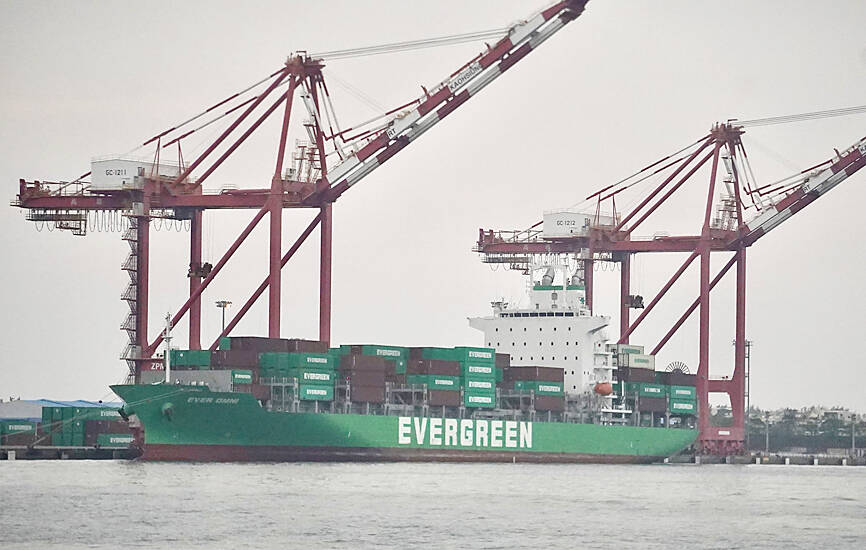Exports last month fell 4.5 percent to US$38.11 billion, snapping a rebound in September, as the global economic slowdown curtailed demand for tech as well as non-tech products, offsetting strong demand for devices used in artificial intelligence, the Ministry of Finance said yesterday.
The economic gauge could resume a modest uptick of 3 to 6 percent this month, as shipments of electronics could emerge from inventory adjustments and move toward a recovery, Department of Statistics Director-General Beatrice Tsai (蔡美娜) said.
“That may happen this month or in January of next year at the latest,” Tsai said, adding that recent guidance by Taiwan Semiconductor Manufacturing Co (TSMC, 台積電), the world’s largest contract chipmaker, lent support to the observation.

Photo: CNA
TSMC said last month it has spotted early signs of stabilization in demand for personal computers and smartphones following several quarters of inventory adjustments, which suggest healthy business for next year.
Exports of electronics, which accounted for 41 percent of all outbound shipments, decreased 7.4 percent year-on-year to US$15.64 billion, as firms remained cautious in dealing with sticky inflation, monetary tightening and intensifying geopolitical tensions, Tsai said.
Conservative sentiment hit all product categories except for information and communications technology (ICT) products, which surged 37.6 percent from a year earlier to US$9 billion, thanks to exploding artificial intelligence applications in the US, she said.
That explained why shipments bound for the US market spiked 12.1 percent to a new high of US$7.19 billion, Tsai said, adding that the picture was not bright elsewhere.
Exports tumbled 22.7 percent to Japan, softened 16.8 percent to Europe and decreased 3.6 percent to China, consistent with their lackluster economic showings, Tsai said.
Shipments to ASEAN markets squeezed out a 1.5 percent increase, also on the back of ICT products, the ministry found.
Imports retreated at a faster pace of 12.3 percent to US$32.34 billion, falling for 12 months in a row, it said. The data gave Taiwan a trade surplus of US$5.77 billion, an increase of 91.2 percent from a year earlier, Tsai said.
Taiwanese firms bought US$8.85 billion worth of electronics that would later be turned into exports, another sign that a recovery might be just around the corner, she said.
However, imports of capital equipment plunged 32 percent to US$4.9 billion, with imports of semiconductor equipment diving 54.6 percent to US$1.69 billion, the ministry said.
Vanguard International Semiconductor Corp (世界先進) yesterday trimmed its capital spending for the third time to NT$9 billion (US$279.5 million) this year, citing poor sales and order visibility.
In the first 10 months, exports fell 12.9 percent to US$355.09 billion, while imports decreased 19 percent to US$295.44 billion, the ministry said.
Tsai said exports for the whole of this year are bound to weaken 10 percent from last year.

CHIP RACE: Three years of overbroad export controls drove foreign competitors to pursue their own AI chips, and ‘cost US taxpayers billions of dollars,’ Nvidia said China has figured out the US strategy for allowing it to buy Nvidia Corp’s H200s and is rejecting the artificial intelligence (AI) chip in favor of domestically developed semiconductors, White House AI adviser David Sacks said, citing news reports. US President Donald Trump on Monday said that he would allow shipments of Nvidia’s H200 chips to China, part of an administration effort backed by Sacks to challenge Chinese tech champions such as Huawei Technologies Co (華為) by bringing US competition to their home market. On Friday, Sacks signaled that he was uncertain about whether that approach would work. “They’re rejecting our chips,” Sacks

NATIONAL SECURITY: Intel’s testing of ACM tools despite US government control ‘highlights egregious gaps in US technology protection policies,’ a former official said Chipmaker Intel Corp has tested chipmaking tools this year from a toolmaker with deep roots in China and two overseas units that were targeted by US sanctions, according to two sources with direct knowledge of the matter. Intel, which fended off calls for its CEO’s resignation from US President Donald Trump in August over his alleged ties to China, got the tools from ACM Research Inc, a Fremont, California-based producer of chipmaking equipment. Two of ACM’s units, based in Shanghai and South Korea, were among a number of firms barred last year from receiving US technology over claims they have

BARRIERS: Gudeng’s chairman said it was unlikely that the US could replicate Taiwan’s science parks in Arizona, given its strict immigration policies and cultural differences Gudeng Precision Industrial Co (家登), which supplies wafer pods to the world’s major semiconductor firms, yesterday said it is in no rush to set up production in the US due to high costs. The company supplies its customers through a warehouse in Arizona jointly operated by TSS Holdings Ltd (德鑫控股), a joint holding of Gudeng and 17 Taiwanese firms in the semiconductor supply chain, including specialty plastic compounds producer Nytex Composites Co (耐特) and automated material handling system supplier Symtek Automation Asia Co (迅得). While the company has long been exploring the feasibility of setting up production in the US to address

OPTION: Uber said it could provide higher pay for batch trips, if incentives for batching is not removed entirely, as the latter would force it to pass on the costs to consumers Uber Technologies Inc yesterday warned that proposed restrictions on batching orders and minimum wages could prompt a NT$20 delivery fee increase in Taiwan, as lower efficiency would drive up costs. Uber CEO Dara Khosrowshahi made the remarks yesterday during his visit to Taiwan. He is on a multileg trip to the region, which includes stops in South Korea and Japan. His visit coincided the release last month of the Ministry of Labor’s draft bill on the delivery sector, which aims to safeguard delivery workers’ rights and improve their welfare. The ministry set the minimum pay for local food delivery drivers at